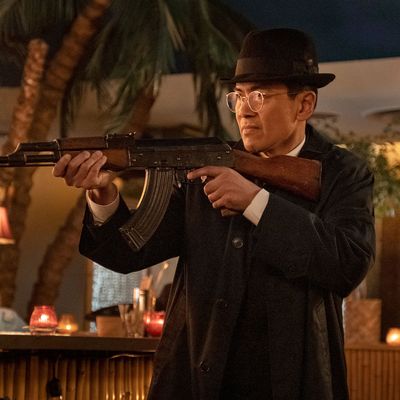
How do you end a four-season show based on a what-if premise? One option would be to collapse the entire concept, but then wouldn’t the previous four seasons amount to something of a waste of time? How do you end The Man in the High Castle in way that feels resonant and faithful to what came before? And how do you do so while navigating the gray area occupied by any show that features murderers as central characters? The team behind The Man in the High Castle answers most of these questions satisfactorily, killing one of their murderers and leaving the other one in servitude of a monster, while also doing what shows like this are often forced to do: leave us on an ambiguous note. Yes, the source material by Philip K. Dick is intentionally very ambiguous, but this show has deviated from it so much over the years that fans may be disappointed that the final scene of the Amazon Prime hit leaves nearly as many questions as answers.
So in an attempt to navigate those answers and their attendant questions, we’re going to structure this final recap a bit differently, looking at where we left each of the characters who defined this series.
Of course, we have to start with John Smith. In the first season, he was more of a clear-cut antagonist for Juliana Crain and the Resistance, although even then Rufus Sewell added enough depth to the character that he started to steal focus, something that increased with each subsequent season. By the final year, the show was undeniably about him — the banner that one clicks on to access the show on Amazon is his picture. John Smith was an American who found out that he rose more quickly in power with the Third Reich than he likely ever would have in the reality in which the Allies won the war. While his final speech this episode brilliantly hints at what learning this would do to a man, it felt a bit like an underdeveloped theme this season. Think about what John Smith learned — as he says before shooting himself in the head, he discovered that he essentially became the worst version of himself he could be. He knows he made the wrong decisions. He wasn’t just a victim of difficult circumstances, he was complicit in destruction, death, and murder.
We like to presume that we are the product of what happens to us, but John Smith got to see a happier, better version of himself. As his wife points out to him, he failed everyone in his life. His son is dead — likely in both realities — one daughter hates him and the other is a morally bankrupt Nazi. John Smith may be a leader, and his actions did somewhat lead to peace at the end of this episode, but it’s important to recognize that he is a failure as a human being. It’s this realization that leads to his suicide, and the most satisfying arc from premiere to finale. This was a show about people inspired by an alternate reality to change their world. That same alternate reality only proved to John Smith that he was a monster.
While we’re on the Smith family, let’s talk about Helen. At first, she was merely a supporting character, but she became richer and more developed as John’s arc became more prominent. Chelah Horsdal did consistent, underrated work as a counter to John’s evil. She suffered unbelievable pain over the loss of her son, and that’s what pushes her to make the decisions she makes in the end, including the game-changing one that informs the Resistance when their train will be headed to the portal. The best scene in the finale (and maybe the season) really delineates Helen and John. He reveals to her that Thomas is alive in the other world and that he wants to bring him to this one. Helen is aghast — she would never ruin her son’s life by bringing him here. John sees people as possessions; Helen would rather Thomas be happier in an alternate reality than alive in hers.
Juliana Crain was the protagonist for most of the run of The Man in the High Castle, and she’s there in its final scenes, witnessing John Smith’s suicide and then seeing the portal open (which we’ll get to later). So how did she get here? In terms of writing and development, Juliana was the major weakness of High Castle, especially this season. It felt like after the show eliminated Frank Frink and Joe Blake, it often wasn’t sure what to do with her. And Alexa Davalos always worked better with Rupert Evans and Luke Kleintank than she did on her own, or with Jason O’Mara’s Wyatt Price this season. Consequently, the arc of a woman who often bounced from plot point to plot point without enough agency as a character feels like the least satisfying piece of The Man in the High Castle when we look at the series as a whole.
Season four allowed more time with Brennan Brown’s Robert Childan, the antique dealer who is left somewhat in limbo, although we can presume that the Yakuza will help him get to Japan and reunite with his new wife, Yukiko. Their arc was a refreshing bit of light in a very dark season, and Brown deserves credit for doing a lot with often very little over his run on the series.
The fourth season also introduced us to the Black Communist Rebellion, led by Frances Turner’s Bell Mallory and Clé Bennett’s Elijah. The performances here were solid, but it all felt a bit underdeveloped. How civil rights would still be a major factor in society, even in a world occupied by our enemies of World War II, is a theme that one wishes the writers had embedded in the show from the beginning. Some elements here felt like too little, too late.
Finally, there’s Inspector Kido, Joel de la Fuente’s murderous soldier of the Japanese regime, who went from killing Frank Frink’s family and butting heads with Tagomi (Cary-Hiroyuki Tagawa’s energy was greatly missed in the final season) to dealing with the end of the Japanese regime in the Pacific States. How audiences were supposed to feel about Kido at the end was a tough question to answer, and the writers handled this element well. Kido can’t return to Japan a hero — he’s been a vicious murderer of women and children — but he does get a bit of redemption by essentially sacrificing his life for his son’s, freeing him from the Yakuza and basically taking his place. If you think about it, this arc is kind of the inverse of John Smith’s. Whereas the Reich leader arguably failed because he couldn’t let go of his son, Kido sacrifices himself in order to give his boy a better life.
In the end, Wyatt, Juliana, and Hawthorne get to the portal, which has been acting funky lately. It snaps to life and casts a bright, warm light on the room, as people begin to walk through without the sci-fi pyrotechnics of the past. It would appear the connection between our world and the alternate reality is open, and people are using it like a revolving door. Could people who died in the camps post-WWII in a world where the Nazis won walk through? Is it even possible that the Doppelgänger Dilemma of the portal is now defunct? Hawthorne isn’t willing to wait — he heads to the other side, likely in search of his wife. After all, that other world is the one he’s been obsessed with for years, and there’s something poignant about the person known as “the Man in the High Castle” being the one who carries the final scene of the show that bears his name. It’s time for him to stop dreaming and start searching.
Join the Resistance
• MVP of the series has to be Rufus Sewell. But to whom would you give runner-up? Overall, I’d say Rupert Evans never got quite the credit he deserved. For the final season, it would have to be Joel de la Fuente or Brennan Brown. The former had some heavy lifting to do with Tagawa gone, and the latter really carved a new arc for his character with a love story. They were both very strong.
• Do you wish the show wasn’t over? They left just enough threads dangling for a fifth season to be developed, at least in fanfiction. Does Childan find happiness in Japan? What happens to Jennifer and Amy Smith with their parents dead? Could they find happiness in the alt-world with a still-alive Helen and (for now) Thomas? How does Kido’s Yakuza employment play out? How does the development of the Negro State progress?
• Of course, part of the joy of any sci-fi property, especially one based on the work of a man who trafficked in ellipses more than periods, is the ambiguity. We wouldn’t want a show like this to end too definitively. Although that balance is tough. Are you left enjoying the opportunity to ponder the questions above, or angry that more of them aren’t answered?
• Thanks so much for reading all these years. Four seasons! It’s been fun writing about this show, and I really appreciate those who have read every recap.


